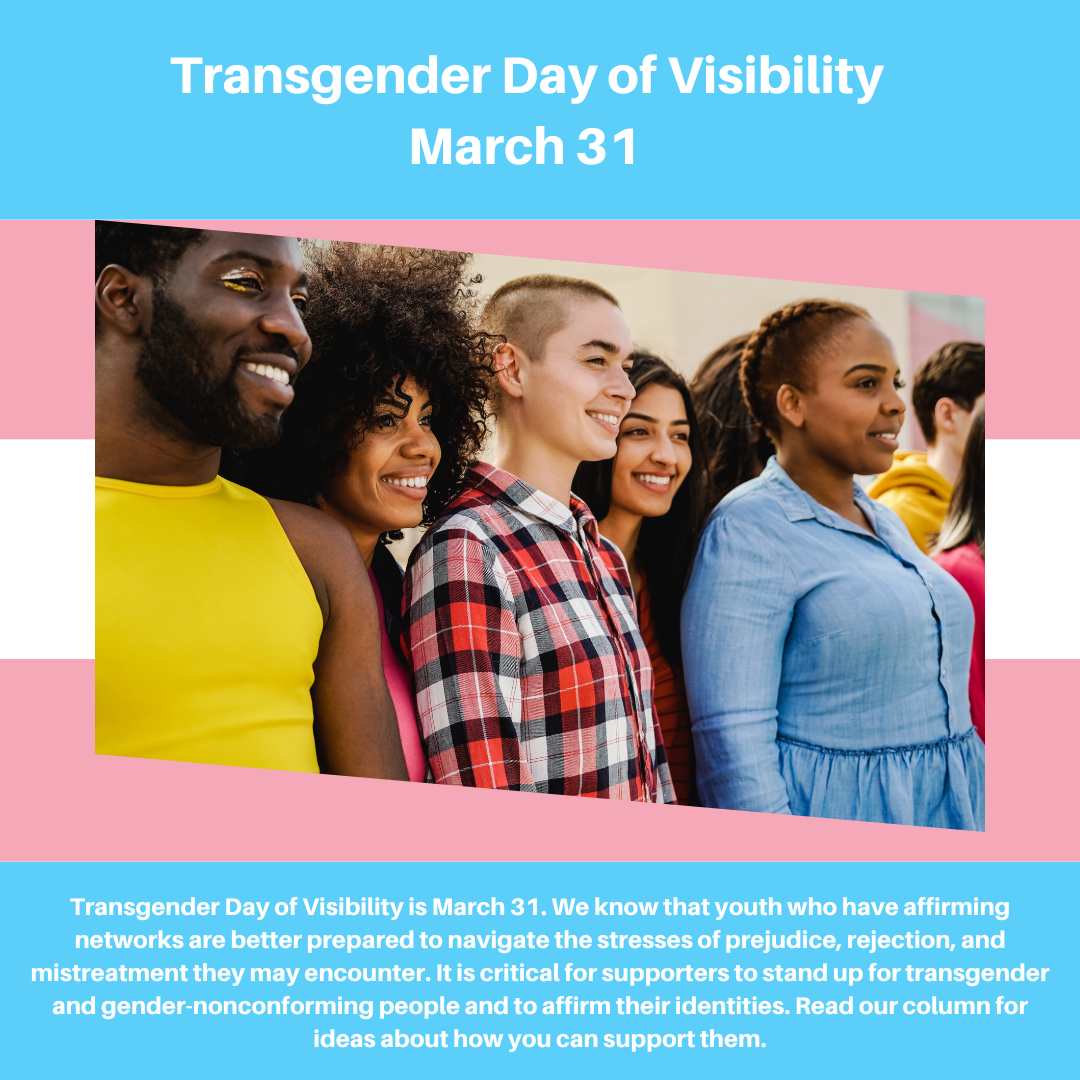Transgender Day of Visibility
 March 31 marks Transgender Day of Visibility or TDOV. TDOV began in 2009 when Rachel Crandall of Transgender Michigan wanted to set aside a day to recognize and celebrate transgender people and their accomplishments rather than focusing on violence directed toward them. While celebrating transgender and gender-nonconforming people, it is critical that we raise awareness of the work that still needs to be done.
March 31 marks Transgender Day of Visibility or TDOV. TDOV began in 2009 when Rachel Crandall of Transgender Michigan wanted to set aside a day to recognize and celebrate transgender people and their accomplishments rather than focusing on violence directed toward them. While celebrating transgender and gender-nonconforming people, it is critical that we raise awareness of the work that still needs to be done.
Kinnect has seen firsthand the importance of creating an affirming family network for youth who identify as LGBTQ+. From 2017-2021, Kinnect partnered with Cuyahoga County Division of Children Family Services, Case Western Reserve University, and A Place for Me on Affirm Me, a grant project designed to improve outcomes for youth with diverse sexual orientations, gender identities, and gender expressions (SOGIE) who were in foster care. Kinnect implemented the Chosen Affirming Family Finding (CAFF) model, the goal of which is to help youth build a robust network of affirming individuals who provide belonging, support, and emotional and even legal permanency. We are currently working to incorporate the CAFF model into our Kinnect to Family (KTF) growth strategy, so stay tuned for more information in the coming months. We are doing this because we know that LGTBQ+ youth are at greater risk of interpersonal or community violence, bullying, discrimination, and physical and mental health challenges including suicidal ideation.
In Ohio and across the nation, state legislatures are contemplating legislation that would ban gender-affirming medical treatment for minors, including treatment that is recommended by medical professionals in partnership with parents. They are contemplating legislation that would ban transgender youth from participating in sports and legislation that would limit conversations and instruction on LBTQ+ issues in schools. Over 420 anti-LGBTQ+ bills have been introduced according to the American Civil Liberties Union.
We know that youth who have affirming networks are better prepared to navigate the stresses of prejudice, rejection, and mistreatment they may encounter. And we know that youth who report having even one trusted adult are 40% less likely to report a suicide attempt. It is critical right now for supporters to stand up for transgender and gender-nonconforming people and to affirm their identities. Below is advice on how families, kin, and communities can support youth who identify as LGBTQ+. It is drawn from our work, and from Youth.gov, part of the Substance Abuse and Mental Health Services Administration.
• Talk openly with youth about their LGBTQ+ identity in an affirming manner
• Offer your own pronouns, and ask youth what pronouns they use
• Ask youth their preferred name, and use that name when addressing them or referring to them
• Display and share symbols, images, and resources that accept and affirm the identity of young people who identify as LGBTQ+
• Respond positively to the youth’s gender expression including hairstyle, dress, and appearance
• Communicate that the young person can have a happy future as an LGBTQ+ adult
• Welcome the youth’s LGBTQ+ friends and support their involvement in LGBTQ+ youth groups
• Work to ensure that other family members respect the young person
• Talk with clergy and help their faith community support LGBTQ+ individuals
• Advocate for youth if they are mistreated because of their identity
I hope you will join us in celebrating and affirming transgender and gender-nonconforming people on this Transgender Day of Visibility. You can post an affirming message on Equality Ohio’s Notes for #Transjoy, and find a list of marches taking place around the state here.
